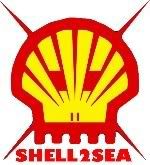
Thursday, June 03, 2004
Mayday '04: So it's all over and bound for legend.
They said the 'ruck at the truck' was a big riot and it wasn't. Now nobody is saying there weren't problems but it was a full on, good humoured, confrontational and effective climax to the weekend and the perfect retort to an anti-democratic Government attempting to scare it's own citizens off the streets. The Reclaim The Streets the following Monday was the full on pinnacle of what a self-generated free party can be. The State may have tried to cow us all into submission, to stay at home and watch TV but the streets were alive and word travelled fast - no matter what the 'Irish' rags told people over the Mayday weekend, thousands of people realised that the streets of Dublin were - 'OUR STREETS'!
Much of the media coverage of the Saturday night's events at the Ashtown gate misrepresented them as a riot. They were not, and the trivial nature of the charges brought - breach of the peace, refusal to obey the instructions of a garda - underline this. (There was however a real riot over the weekend, at the Rally of the Lakes in Killarney, at which more people were arrested than in connection with the whole May Day weekend: strangely, it received little coverage. The main story is surely that between 3 and 5,000 people found the courage to march in the face of the ban and the threat of the riot police, in defence of the freedom of assembly and opinion and as a protest against privatisation, militarisation and "Fortress Europe". A secondary story is surely that the police did indeed attack citizens on the Navan Road, injuring several and arresting two dozen. Yet media attention has largely ignored both of these stories in favour of a focus on the alleged actions of a small number of protestors.
700 people walked and rode their bikes in the biggest Critical Mass yet on Friday. 200 people joined the "No Borders" morning of street theatre, and upwards of 1000 took part in the "Reclaim the City" actions. And several thousand people made the long walk from O’Connell Street to the Ashtown Roundabout in the face of the biggest security operation, and the biggest campaign of vilification, that many of us have ever seen. There was some pushing, and the Gardai started attacking people. We fell back, and brought everybody back to town (except for the 28 inside), and dispersed safely from O’Connell Street."
While the protests may have made headlines, the issues behind them dropped below the radar as the media (purposefully?) focussed on fears of a violence that never materialised. Irish people have generally seen the European Union as a good thing, for reasons that include investment in infrastructure and farm subsidies. But increasingly the EU is an excuse for privatisation, for shifting the burden of taxation onto you and for Ireland's increasing involvement in military adventures. These are the main reasons which propelled various activist groups into organising protests against the EU summit in Dublin.
In advance of joining the EU, the 10 accession countries have had to open their borders to the flow of money, but the movement of the peoples of these countries is to be limited for up to seven years. We welcome the admission of the people of these countries, but the governments of the EU want to keep them out as long as possible, all the while using them as cheap labour. - profit before people. Beyond Europe, many countries have been forced to open their markets to European capital and to low-wage, European-owned factories. European corporations want to use the EU as a common front to force these harsh neo-liberal policies on the third world.
Yet the people of these countries face fences and walls if they try to enter Europe. Many are forced to make desperate boat journeys around these barriers. The EU's repressive anti-immigrant policies claimed the lives of at least 3,000 people between 1993 and June 2003, people drowned in the Mediterranean, electrocuted at the Channel Tunnel or suffocated in Wexford. This is 10 times as many as were killed at the Berlin Wall during its 30-year history. These policies are designed to make immigrants illegal and force them to survive in a precarious, hunted position, or live on short-term visas, dependent on work permits held by their employers. In both cases they are vulnerable and open to extreme exploitation as cheap labour. They have little access to heath and safety enforcement, as shown by the tragic deaths of 19 Chinese people at Morecambe Bay this year.
The foreign policy of the European Union is based on satisfying the interests of Big Business, irrespective of social cost. The militarisation of the EU is evidenced in the Common Foreign and Security Policy and the Rapid Reaction Force (the European Army). These are the EU's tools to promote the global interests of European multinationals. Again profit before people. Bertie has waffled on about protecting Irish neutrality, yet he ignored 100,000 protestors when he allowed the US to use Shannon Airport as its major air stopover for US troops on their way to Iraq. In 2003, 125,000 US troops passed through Shannon en route to the Iraq war. Munitions of war, including Tomahawk, Cruise, and Patriot missile components, as well as napalm, passed through 'neutral Ireland'. Considering this support for the war effort of a country that is not even an EU member, can we believe one word Bertie says about defending Irish neutrality within the EU?
Then, there’s the Lisbon strategy and privatisation. The Irish government's official EU website declares that "the Lisbon strategy is a major priority for the Irish Presidency". The Lisbon Agenda specifically targets "gas, electricity, postal services and transport" for privatisation. Water, health, education and social services will be next.
The first step in privatisation is forcing people to pay for public services to make them profitable and attractive to investors. We can see this here with the bin charges, the back-door reintroduction of third level fees and the threatened privatisation of Dublin Bus and other public services. Privatisation invariably results in worse working conditions, greater inequality of services, lay-offs and wage cuts as bosses seek to cut corners to maintain profits.
It is estimated that Brussels hosts some 500 industry lobby groups, employing some 10,000 professional lobbyists. Corporations that spend millions 'lobbying' the EU make no secret of the influence this brings. One of the most powerful is the European Round Table of Industrialists (ERT), which brings together more than 40 "European industrial leaders." Ireland is represented by Michael Smurfit, while most of the other corporations are household names across Europe, such as BP, Unilever, Carlsberg, Fiat, Vodafone, Volvo, Philips, Nokia, Renault and Shell.
The ERT has boasted that "at European level, the ERT has contacts with the Commission, the Council of Ministers and the European Parliament ... Every six months the ERT meets with the government that holds the EU presidency to discuss priorities ... At national level, each member has personal contacts with his own national government and parliament, business colleagues and industrial federations, other opinion-formers and the press."
Baron Daniel Janssen of the ERT boasted that it was "very much involved in the preparation of the [Lisbon] Summit." In Lisbon EU policy was shaped by the 40 "industrial leaders" of the ERT and not by the 50,000 demonstrators outside the summit building or by the needs of the people of Europe. Now we are all required to dance to the ERT tune, and as outlined elsewhere in the Fresher’s Guide, this is going to have particularly negative effects on education, turning it from a service to a commodity.
It was for these reasons and more that so many people chose to ‘bring the noise’ and march towards Phoenix Park on Mayday, while our leaders and bureaucrats and dined off our taxes in Farmleigh House. They say we are apathetic? Well, maybe we are just sick of the politics they spoon-feed us, and want to begin defining our own futures, on our terms.
About Soundtracksforthem specialises in iconoclastic takes on culture, politics, and more shite from the underbelly of your keyboard. A still-born group blog with a recent surge of different contributers but mainly maintained by James R. Big up all the contributers and posse regardless of churn out rate: Kyle Browne, Reeuq, Cogsy, Chief, X-ie phader/Krossie, Howard Devoto, Dara, Ronan and Mark Furlong. Send your wishes and aspirations to antropheatgmail.com
Label Cluster
In no certain order...
Politics,
Guest Bloggers
Interviews,
Music,
Internet,
Guest Bloggers,
Travel,
Blogging,
TV,
Society,
Film,
Gig Reviews,
Art,
Media.
The Neverending Blogroll
A Womb Of Her Own
Arse End Of Ireland
BlissBlog
BBC One Music Blog
Blackdown Sound Boy
Buckfast For Breakfast
Customer Servitude
Counago & Spaves
C8
Candy PDF Mag
Guttabreakz
House is a Feeling
Homoludo
Infactah
Indymedia
Indie Hour Blog
Jim Carroll
kABooGIE MusIC
Kid Kameleon
Kick Magazine Toronto
Libcom
Matt Vinyl
Modern Cadence
Mongrel
Nialler9
One For The Road
Old Rotten Hat
Pitchfork
Salvo
Spannered
Sigla
Test
Thumped
Newish Journalism
TV Is Crying
Uncarved
Una Rocks
Urban75
Weareie
WSM
Wooster
Village Magazine
Radical Urban Theory
Archives
February 2002
October 2002
April 2003
September 2003
November 2003
December 2003
January 2004
February 2004
March 2004
June 2004
September 2004
January 2005
February 2005
March 2005
April 2005
June 2005
July 2005
August 2005
September 2005
October 2005
November 2005
December 2005
January 2006
February 2006
March 2006
April 2006
May 2006
June 2006
July 2006
August 2006
September 2006
October 2006
November 2006
December 2006
January 2007
February 2007
March 2007
April 2007
May 2007
June 2007
July 2007
August 2007
September 2007
October 2007
November 2007
December 2007
January 2008
February 2008
March 2008
A Hatchet Job On Hatching A Plot
Working In A Music Store: More Coal Face Than Hip...
Interview: Chilean Student Activist On Educational...
The Death Of Free Education -Sneaking Fees In Thro...
They've lost everything except abortion, abortion ...
UCD Students Protest At Fianna Fail AGM
The Final Leg and The Sad Composer.
`Anarchist, Ireland?´- they looked bemused and men...
Doing the Tourist Thing
Paris - Sleeping In Morrisons Grave - The Insurrec...
